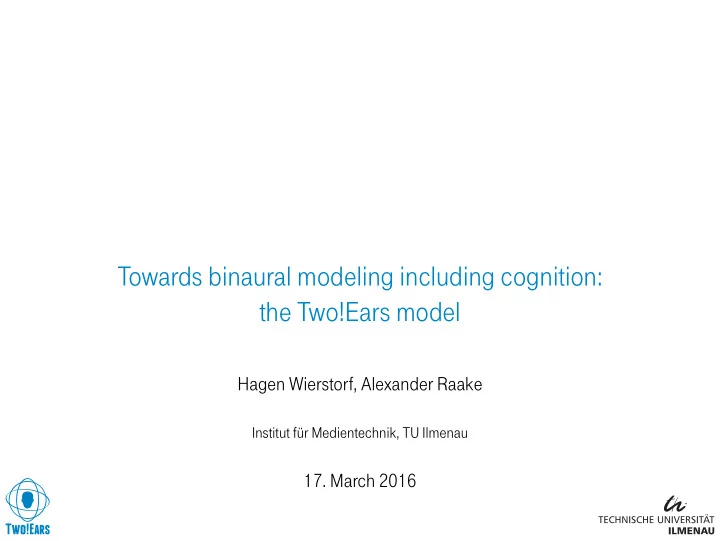

Towards binaural modeling including cognition: the Two!Ears model Hagen Wierstorf, Alexander Raake Institut für Medientechnik, TU Ilmenau 17. March 2016
Motivation Target Goal: Masker 1. Identify target and localise it Masker Masker 2. Understand target Results changes Prior knowledge Interactive listening Listener Kopˇ co et al. (2010), Speech localization in a multitalker mixture, JASA Brungart and Simpson (2007), Cocktail party listening in a dynamic multitalker environment, Perception & Psychophysics Josupeit and Hohmann (2015), Modeling localization and word recognition in a multitalker setting, DAGA 1 /14
Model structure Extraction of meaning Memory Identity Location Decision Extraction of auditory features Interactive binaural signal acquisition 2 /14
Auditory front-end Extraction of meaning Memory Identity Location Decision Extraction of auditory features Interactive binaural signal acquisition 3 /14
Auditory front-end AMToolbox, but in a combined manner Block based processing Change of parameter during processing Just ask for the auditory features you need Decorsière et al. (2015), Two!Ears Auditory Front-end 1.0, doi: 10.5281/zenodo.28008 4 /14
Auditory front-end 5 /14
Robot / Binaural simulator Extraction of meaning Memory Identity Location Decision Extraction of auditory features Interactive binaural signal acquisition 6 /14
Robot Simple recording of binaural signals Allows for arbitrary positioning You need a robot Complicated software engineering Bustamante et al. (submitted), Towards information-based feedback control for binaural active localization, ICASSP 7 /14
Binaural simulator Block-based convolution of impulse responses and audio material Uses the convolution C++ core of the SoundScape Renderer ⇒ mex-file Acoustic scene has to be specified Database needed Winter et al. (2015), Two!Ears Binaural Simulator 1.0, doi:10.5281/zenodo.28010 8 /14
Binaural simulator Database of impulse responses Collection of new measurements and existing ones Usage of SOFA file format 1 1 2 4 3 2 3 4 y 1 . 0 m x 1 . 0 m Loudspeaker and KEMAR positions Winter et al. (submitted), Database of binaural room impulse responses of an apartment-like environment, 140th AES 9 /14
Blackboard system Extraction of meaning Memory Identity Location Decision Extraction of auditory features Interactive binaural signal acquisition 10 /14
Blackboard system Localization of multiple sources in reverberant environments Extraction of meaning Memory Location Decision Performance increases by Multi-conditional training Step wise head rotations Ma et al. (2015), A machine-hearing system exploiting head movements for binaural sound localisation in reverberant conditions, ICASSP May et al. (2015), Robust localisation of multiple speakers exploiting head movements and multi-conditional training of binaural cues, ICASSP 11 /14
Blackboard system Identify target and localize it Extraction of meaning Memory Identity Location Decision Interaction between localisation and identification implemented by segmentation: Ma et al. (2015), Exploiting top-down source models to improve binaural localisation of multiple sources in reverberant environments, Interspeech 12 /14
Getting involved Ultimate Goal is to provide a framework that can be used by everyone in order to help advance binaural modeling Development Documentation http://twoears.aipa.tu-berlin.de/doc https://github.com/twoears http://twoears.eu 13 /14
Conclusion Highlights: Incorporation of top-down processes Auditory front-end: just ask for an auditory feature Binaural simulator: interaction with the acoustic scene Database: large collection of HRIRs and BRIRs all in the same format Large documentation Challenges: Complexity of the model Usability could be improved 14 /14
http://spatialaudio.net
Recommend
More recommend